Are you staring at the daunting task of estate planning and not sure where to begin? You're not aloneâmany people find the intricacies of wills, trusts, and legacies overwhelming. A well-crafted plan is crucial to ensure your wishes are honored and your loved ones are protected. Dive in with us as we explore the essential steps of estate planning and help you take the first step toward peace of mind.

Client's personal and family information
When conducting an estate planning consultation, it is crucial to collect comprehensive personal and family information. Essential details include the client's full name, date of birth, and Social Security number for identification and record-keeping. Understanding marital status, such as single, married, divorced, or widowed, helps shape planning strategies. It is also vital to gather information on spouse details, including full name and date of birth, and any previous marriage history. Additionally, information about children, including names, dates of birth, and contact details, provides insight into potential heirs and beneficiaries. Notable family dynamics, such as dependents, stepchildren, or other significant relatives, contribute to a holistic understanding of the client's wishes. Collecting asset details, like real estate properties (homes, investments), bank accounts, retirement funds, and personal valuables, ensures a complete picture of the client's financial landscape. Understanding debts, including mortgages and loans, rounds out this crucial profile in preparation for effective estate planning.
Purpose and objectives of estate planning
Estate planning serves as a critical process for individuals and families to manage their assets (such as real estate, financial accounts, and personal belongings) and ensure these assets are distributed according to their wishes after death. The primary purpose encompasses minimizing taxes (like estate taxes, which can significantly reduce the inheritance) and avoiding probate (the lengthy legal process of validating a will), which can delay asset distribution. Additionally, estate planning provides a framework for medical decision-making (through documents such as a healthcare proxy) in case of incapacitation, allowing legally designated individuals to make choices on behalf of the individual. The objectives include safeguarding the financial future of beneficiaries (including children or dependents), ensuring specific bequests (donating beloved items or funds to organizations or individuals), and providing clarity and peace of mind for all parties involved. This proactive approach enables individuals to outline their values and wishes, ultimately preserving familial harmony and mitigating potential conflicts over asset distribution.
Asset inventory and financial overview
An effective estate planning consultation involves creating a comprehensive asset inventory and a financial overview tailored to an individual's unique situation. The asset inventory should include high-value items such as real estate properties, like residential homes in cities such as New York or San Francisco, along with vehicles, art collections, and collectibles. Financial accounts should also be meticulously listed, including bank accounts from institutions like Chase or Bank of America, investment portfolios containing stocks or bonds, retirement savings plans, and life insurance policies detailing coverage amounts. This meticulous documentation enhances clarity, providing a clear snapshot of all owned assets which is crucial for estate administrators. Evaluating debts, including mortgages or personal loans, offers insight into the net worth and financial health, guiding future decisions on asset distribution. Overall, the consultation aims to ensure that all financial components are accurately accounted for, facilitating a smoother estate planning process.
Specific legal documents needed (wills, trusts, power of attorney)
Estate planning involves critical legal documents essential for managing assets and ensuring wishes are fulfilled. A will serves as a legal declaration specifying how an individual's assets will be distributed upon death, detailing beneficiaries and guardians for minors. Trusts, specifically revocable living trusts, provide flexibility in asset management, allowing individuals to transfer property outside of probate to designated beneficiaries, ensuring privacy and potentially reducing estate taxes. A power of attorney designates trusted individuals to make decisions regarding an individual's financial and healthcare matters, particularly in the event of incapacitation, safeguarding the person's interests. Identifying these documents forms the foundation of comprehensive estate planning, ensuring that personal and financial affairs are in order.
Scheduling and consultation logistics
Estate planning consultations often require careful organization and planning. To ensure an efficient meeting, it is essential to confirm scheduling details, such as available dates and times that align with the client's preferences. The consultation could take place in a designated office space, such as a law firm specializing in estate planning located in a metropolitan area like New York City. In addition, requisite documents such as wills, powers of attorney, and property deeds must be gathered beforehand to facilitate discussion of strategies tailored to the client's specific circumstances. Furthermore, discussing any unique family dynamics or assets, like real estate properties valued over $500,000 or investment portfolios exceeding $250,000, can significantly enhance the consultation's effectiveness and help create a comprehensive estate plan.
Letter Template For Estate Planning Consultation Samples
Letter template of estate planning request for detailed service overview
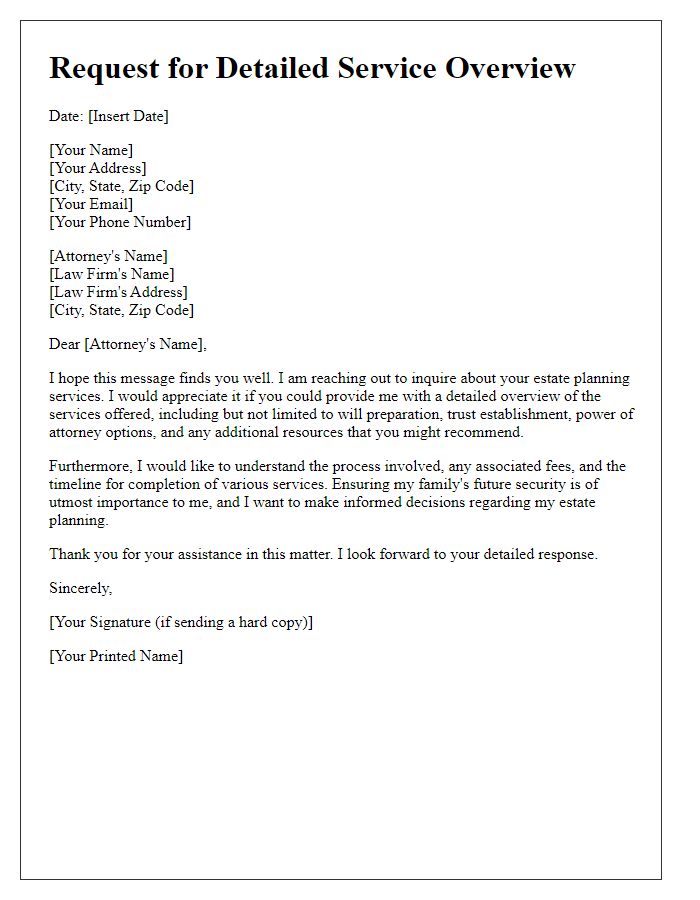

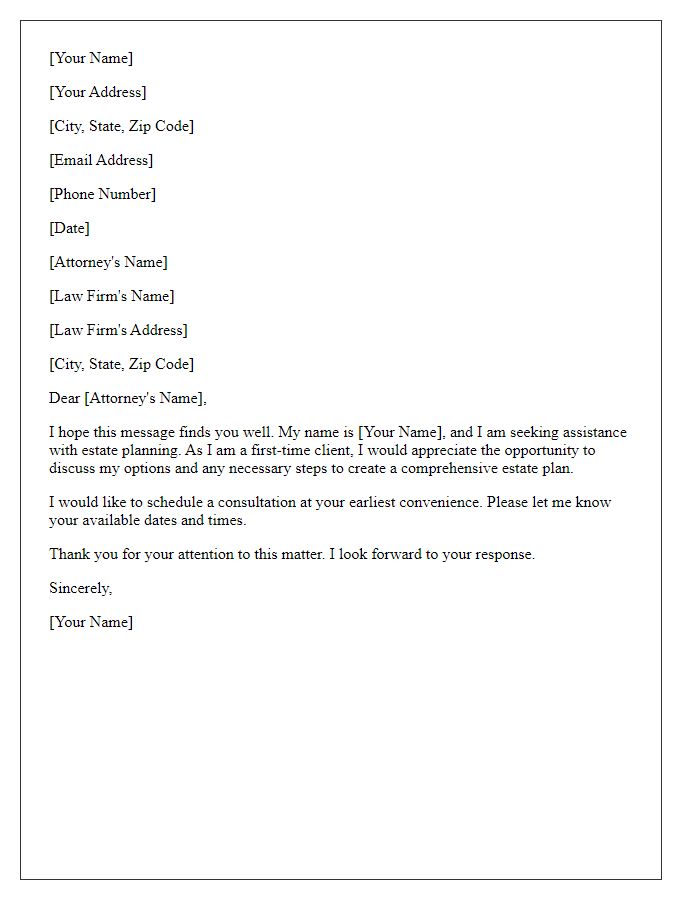
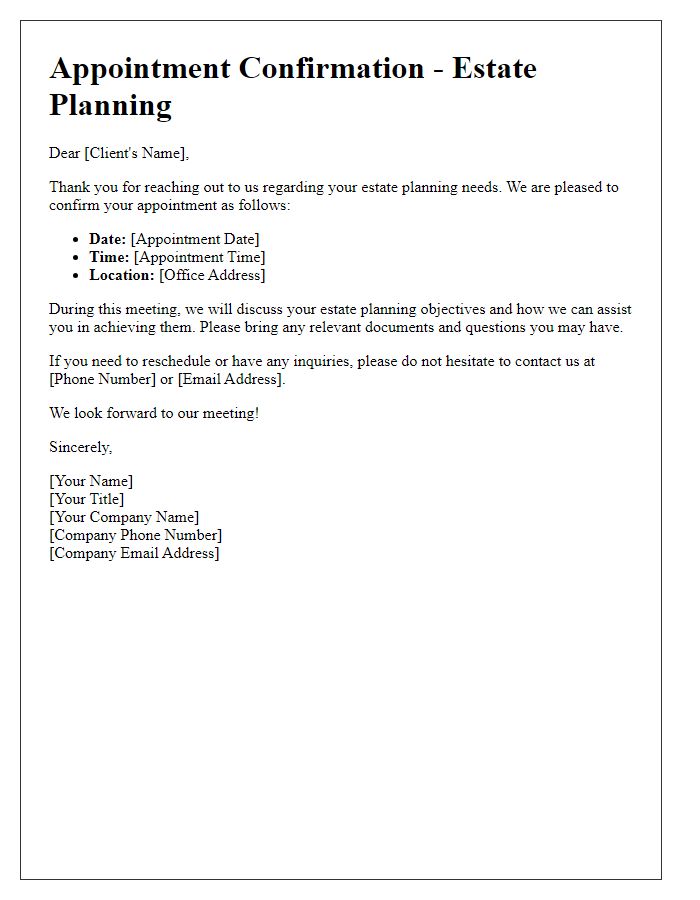
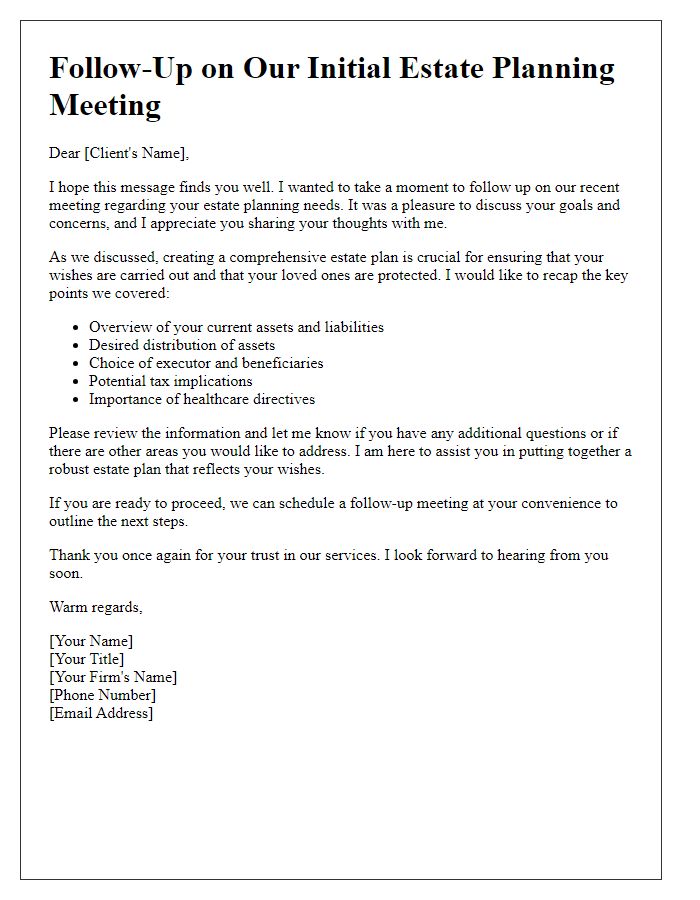
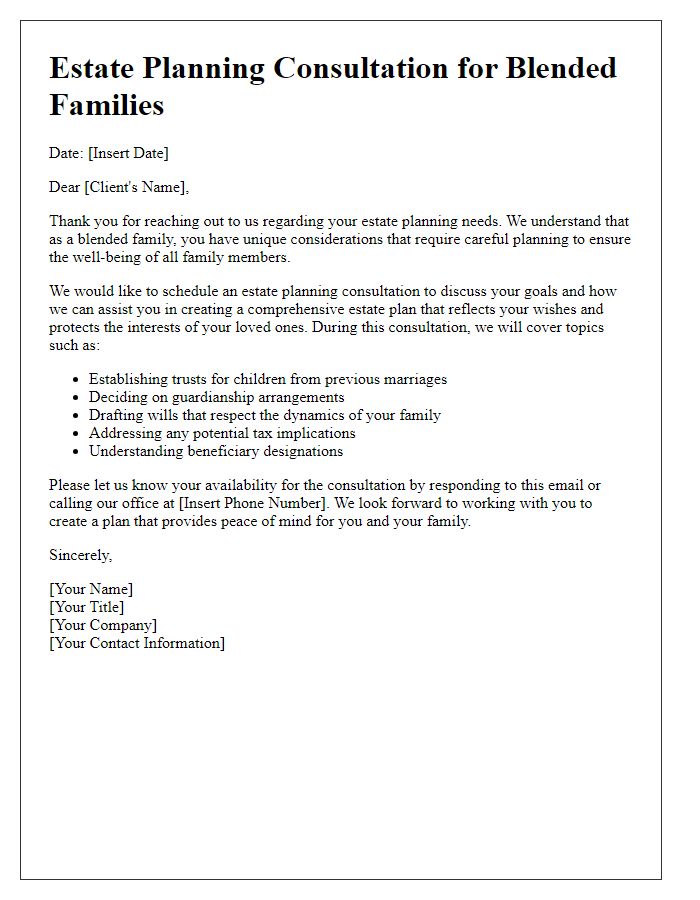
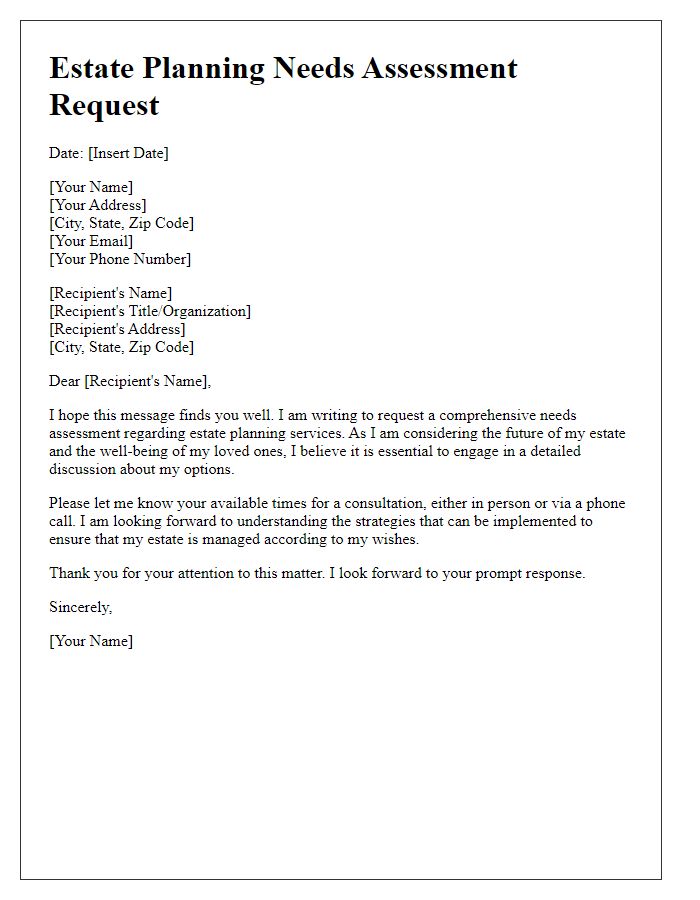


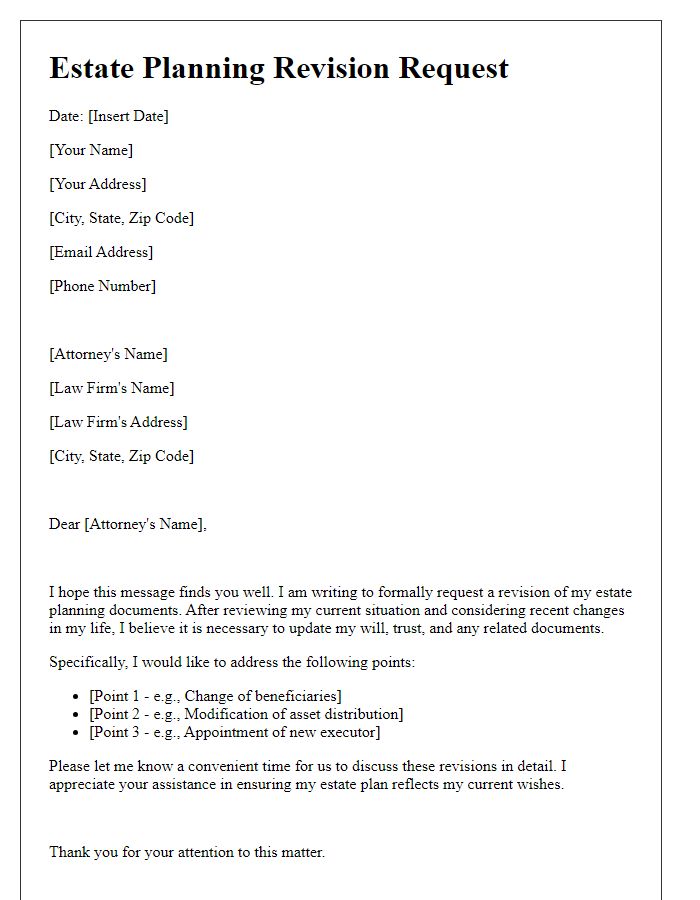
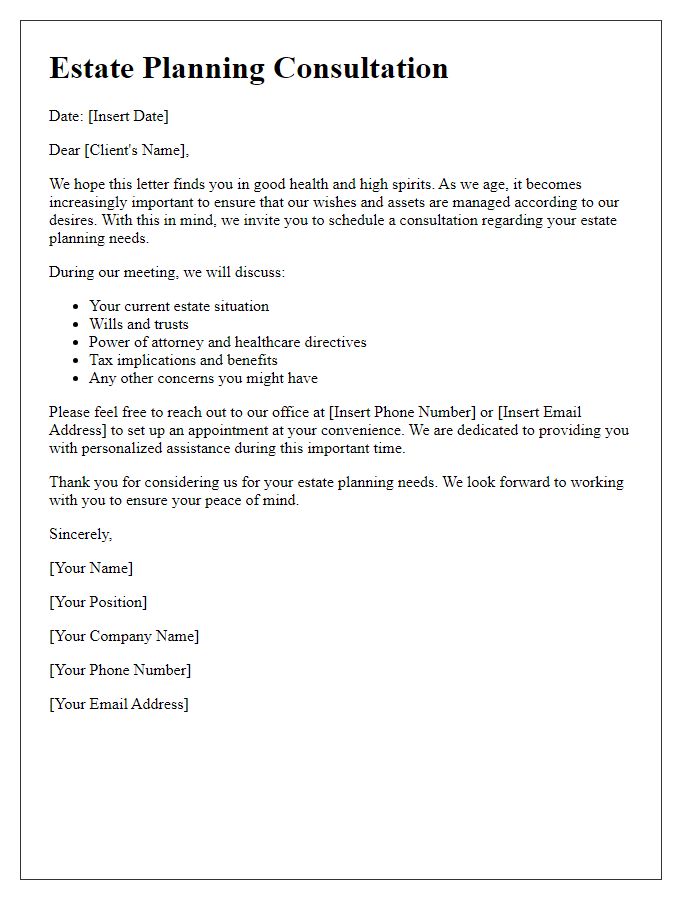


Comments